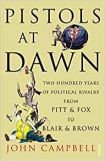Pistols at Dawn: Two Hundred Years of Political Rivalry from Pitt and Fox to Blair and Brown by John Campbell
| Pistols at Dawn: Two Hundred Years of Political Rivalry from Pitt and Fox to Blair and Brown by John Campbell | |
|
| |
| Category: History | |
| Reviewer: John Van der Kiste | |
| Summary: A detailed look at eight pairs of rivals in British politics during the last 200 years, and their consequences for the development of their respective parties. | |
| Buy? Yes | Borrow? Yes |
| Pages: 464 | Date: September 2010 |
| Publisher: Vintage | |
| ISBN: 978-1845950910 | |
|
| |
When Benjamin Disraeli became Prime Minister in 1868 for the first time, he proudly told a friend that he had climbed to the top of the greasy pole. Political history is strewn with cases of rival politicians who have aspired to that same summit, or at least to the leadership of their party. Some have started out as close friends, others as cabinet colleagues whose differences have led their parties to serious electoral defeat if not come close to splitting them altogether.
In this book John Campbell, who has written several major political biographies, looks at eight feuds in all, devoting a full chapter of around fifty pages to each. He analyses each rival's career, their common ground (such as it was), and in summing up assesses which, if either, was the victor and which left more of a mark on posterity. The first is that of William Pitt the Younger and Charles James Fox, the titans of the late 18th century, who between them broadly defined the shape, conventions and rhetoric of British politics for the next two hundred years. Pitt, he argues, was the first modern Prime Minister, while Fox unwillingly created the role of Leader of the Opposition. Pitt held the highest office for nineteen years, while Fox achieved little in his lifetime, but left an enduring legacy in his support for causes such as religious toleration, freedom of speech and parliamentary reform.
A rather fiercer rivalry characterized the relationship between Lord Castlereagh and Lord Canning, each of whom was Foreign Secretary for a while. Both were senior cabinet ministers when in 1809, at the height of the war against Napoleon, they fought a duel on Putney Heath, in which the latter was slightly wounded; both not surprisingly resigned, and the government fell. Castlereagh later took his own life, while Canning went on to become Prime Minister but was already seriously ill and died just four months later.
A different kind of mutual antagonism existed between the Liberal William Gladstone and the Tory Benjamin Disraeli, the two dominant Prime Ministers of the mid-Victorian era. Both were utterly different in personality and beliefs, and they cordially disliked one another. Yet as Campbell underlines, their sparring matches and the swing of the pendulum between their respective governments left enduring legacies on their successors for generations to come, Gladstone in his Midlothian campaign and its 'moral passion' in the peace movements of the next century, Disraeli in his 'One Nation' Conservatism.
Herbert Asquith and David Lloyd George, the two last Liberal Prime Ministers, enjoyed a successful partnership in government until war drove them apart, yet the gentle peacetime, peace-loving leader and the fiery wartime demagogue who deposed him were equally successful in their way. So perhaps were the two senior post-World War Two Labour ministers, Hugh Gaitskell (who led the party for seven years) and another passionate Welshman, Aneurin Bevan, either of whom might have entered No. 10 if they had lived a few years longer. Between them they came close to dividing the Labour party on left-right lines, and rarely seemed united until their condemnation of the Suez crisis in 1956 brought them together.
Harold Macmillan was a classic example of a slow developer. A maverick and a persistent party rebel in his early years as an MP, he was also paradoxically regarded as earnest, toothy, gauche and one of the most boring men in the house. His self-reinvention after the Second World War as stylish yet ruthless character persistently frustrated his colleague R.A. ('Rab') Butler, who twice came close to being chosen as Conservative leader and thus Prime Minister. Yet it was a more subtle rivalry than that between Edward Heath and Margaret Thatcher, the differences between whom delighted copy-hungry journalists as much as they dismayed their fellow party members. While Campbell wisely writes impartially of the feud, he duly notes that she was ever gracious, particularly in her memoirs, to the man whom she defeated in the 'Peasants' Revolt', while he diminished himself by his persistent refusal to return her compliments. As was said at the time, 'the longest sulk in history' indeed.
By sheer coincidence, Tony Blair's memoirs with their withering pronouncements on Gordon Brown's potential as his successor were making news headlines while I was reading this book. The last chapter, on the tortuous relationship between the contemporaries who started as close friends but were soon driven apart by circumstances, has barely entered history, and Campbell doubtless wishes he had had the benefit of the former member for Sedgefield's reminiscences on his bookshelf while writing. History will judge in due course on the relative merits of the dedicated Scottish socialist who as a young man was already planning a political career while his future colleague (and master) was toying with the idea of becoming a rock music promoter before choosing a barrister's life for a while. The latter was extraordinarily lucky in his premiership, not least in being able to resign and hand the poisoned chalice over at a time of his choosing. The book ends with the result of the 2010 election and Brown's subsequent resignation, which like so many of the other case histories in this book does little to dispel Enoch Powell's verdict that 'all political careers end in failure'.
Anybody with an interest in politics and politicians will find this book fascinating. Campbell has done wonders in compressing the chapters so succinctly when he could have probably expanded them to twice the length with no trouble at all, yet the essential facts in each case are here.
Our thanks to Vintage for sending a copy to Bookbag.
If you enjoyed this, for a more in-depth exploration of the 20th century, may we recommend A History of Modern Britain and The Making of Modern Britain, both by Andrew Marr; for the post-war era, No Turning Back: The Peacetime Revolutions of Post-War Britain by Paul Addison; or Having It So Good: Britain in the Fifties by Peter Hennessy.
Please share on: ![]() Facebook,
Facebook, ![]() Twitter and
Twitter and
![]() Instagram
Instagram
![]() You can read more book reviews or buy Pistols at Dawn: Two Hundred Years of Political Rivalry from Pitt and Fox to Blair and Brown by John Campbell at Amazon.co.uk Amazon currently charges £2.99 for standard delivery for orders under £20, over which delivery is free.
You can read more book reviews or buy Pistols at Dawn: Two Hundred Years of Political Rivalry from Pitt and Fox to Blair and Brown by John Campbell at Amazon.co.uk Amazon currently charges £2.99 for standard delivery for orders under £20, over which delivery is free.
![]() You can read more book reviews or buy Pistols at Dawn: Two Hundred Years of Political Rivalry from Pitt and Fox to Blair and Brown by John Campbell at Amazon.com.
You can read more book reviews or buy Pistols at Dawn: Two Hundred Years of Political Rivalry from Pitt and Fox to Blair and Brown by John Campbell at Amazon.com.
Comments
Like to comment on this review?
Just send us an email and we'll put the best up on the site.


